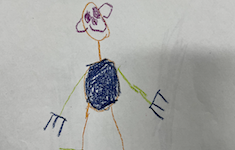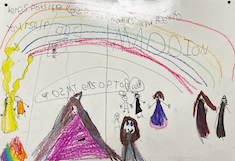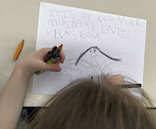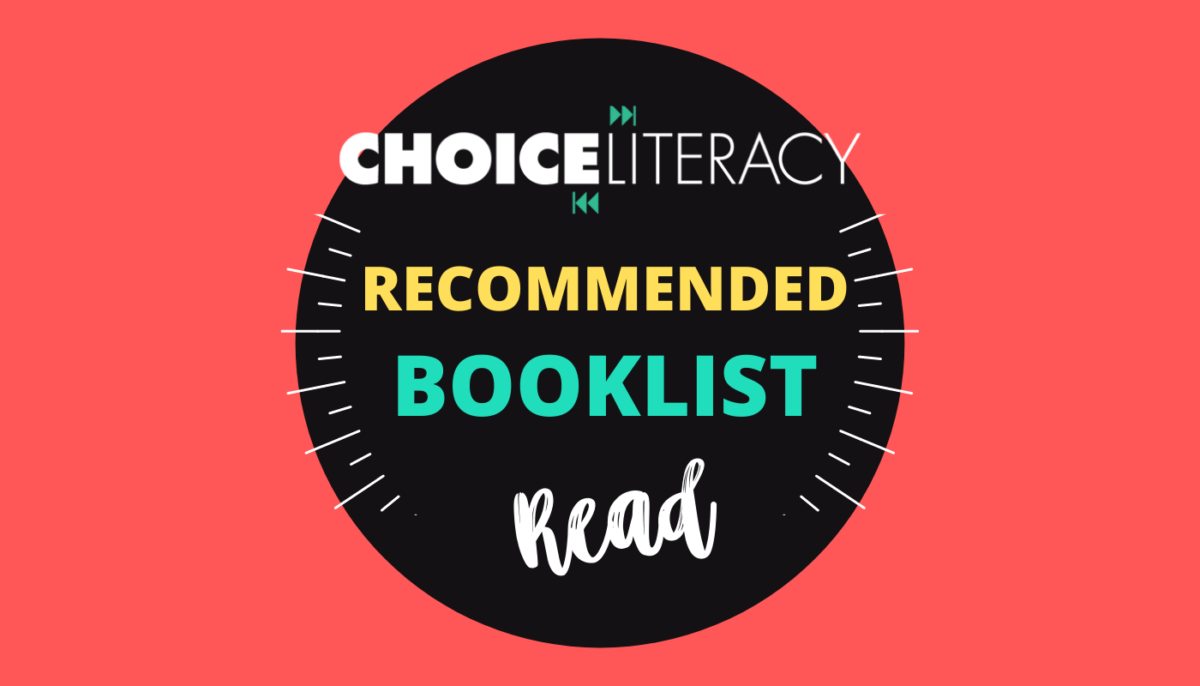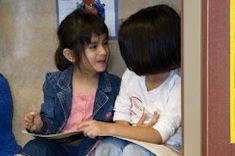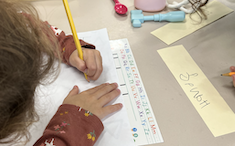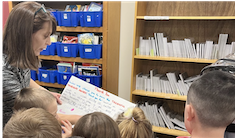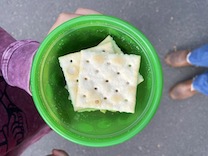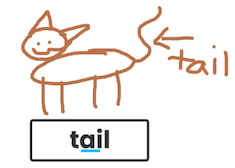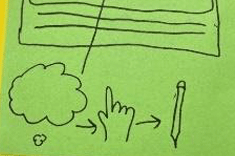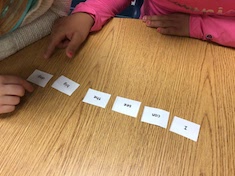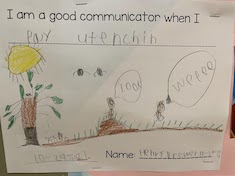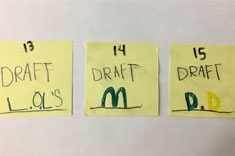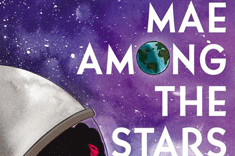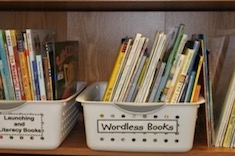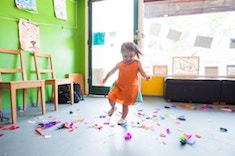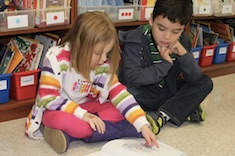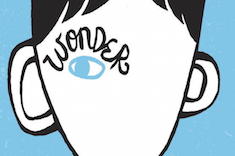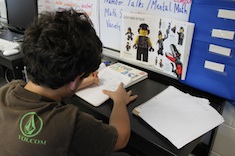Pre-K
Latest Content
Books Are My Management Strategy
Becca Burk reflects on the power of reading as a way to set routines and help nourish healthy regulation.
Pick One: How to Establish a Community of Readers
“Pick one!” These are the words that begin to grow a community of readers. When students say, “I’m done,” Becca Burk points toward the classroom library and encourages them to pick a book and begin growing strong roots as a reader.
Responding to Dysregulated Behaviors: What About the Other Kids?
Becca Burk reflects on the other kids in the classroom who witness dysregulated behaviors from a classmate. She reminds us of the way grace and acceptance are prominent when we look for the silver linings in difficult situations. This is the third installment of a four-part series chronicling the responses when a student with dysregulated behaviors joins Becca Burk’s kindergarten class mid-year.
Early Writing Opportunities in the Library
Gigi McAllister shares informal writing opportunities for students in the school library. Informal and engaging writing activities where students have lots of choice and encouragement make them feel empowered as writers, help them generalize the writing skills they are learning in the classroom, and create joyful writing experiences.
Using Self-Portraits as an Assessment Tool for Early Writers
Becca Burk guides us in using self-portraits as an assessment tool for early writers. Becca shares a rubric, self-portrait samples, and practical next steps for her kindergarten writers.
Writing Will Help
Becca Burk’s kindergartners had a tough recess. As they were discussing what they could do differently, one student proclaimed, “Mrs. Burk, writing, writing will help!” Becca shares what unfolded as students made a plan and created signage to post around the playground as reminders for self-control.
Let’s Write Together: The Importance of Class Books
Jen Court considers whether creating class books is a valuable use of time for today’s young students. As she teases out this question, she realizes class books are a relevant and essential instructional strategy.
Learning from Our Favorite Illustrators
Ruth Metcalfe tapped a plethora of resources to help her first-grade writers understand how to communicate meaning with illustrations.
What’s Your Point of View?
Molly James helps us develop an essential point of view for uplifting choice in decision making for young writers and readers.
Alert! Mistakes in Progress
Becca Burk gives the science behind mistakes and growth, and offers suggestions on ways to use mistakes as a means to help students become critical thinkers and problem solvers.
Energizing Early Readers: The Classroom Library as a Co-Teacher (Booklist)
Ruth Metcalfe shares a fun-loving and inspiring early reader booklist to help boost reading energy in her classroom library.
Validating Students
When an excited young reader interrupts the quiet hum of reading workshop, Becca Burk analyzes the important unseen choices students make as learners, and the powerful messages teachers’ responses send.
Level Two Unlocked: Using the Language of Video Games to Engage Students in the Assessment Experience
Heather Fisher considers the research behind gamified experiences and applies it to a lengthy first-grade phonics assessment. Heather challenges us to gamify assessments to maintain the integrity of the assessment while increasing student engagement.
Helping Writers Self-Correct
What to do with writers who catch errors in isolation but not in their own writing? Cathy Mere suggests three ways to help students self-correct their writing.
Do the Hard Thing
Becca Burk reminds all of us that one of the important parts of being a teacher is helping students believe they are capable. Becca shares three practical ways to uplift student capability.
Good Work, Writer
Becca Burk asserts that every child can become a writer when given materials, opportunity, and authentic glimpses into what it means to be a writer. Most importantly, though, children need adults who believe they are writers.
Math Is Everywhere
Bitsy Parks shares an initial read aloud to encourage primary students to develop the ability to see math everywhere.
Student-Created Assessments
Ruth Metcalfe releases responsibility to her first-grade class to create formative assessments and take ownership in their learning.
Making Feedback Visible for Young Writers
Ruth Metcalfe is determined to make teaching points from writing conferences visible for her young multi-language learners. She offers a how-to guide for all teachers to do the same and make the teaching accessible to students even after the conference is over.
Cut-Apart Sentences in Small-Group Reading
Ruth Metcalfe candidly shares the way she tackles the transfer of reading skills with her small group by using cut-apart sentences.
What “Should” Kindergarten Writing Look Like at This Point in the Year?
Melanie Meehan shares insights to emphasize the importance of responding to emergent writers and understanding the progression of young writers.
What Is Communication? A Mini-Inquiry Project and Booklist
Bitsy Parks leads her first-grade class in a study about communication to strengthen their socially distanced and muffled-by-masks community. Included is a booklist.
Helping Young Writers Make Plans
Tammy Mulligan promotes independence in her student writers by supporting them in creating writing plans. A download of a planning template is included so your students can create writing plans, too.
Offering Playful Choice to Show Learning
Tammy Mulligan shares her quick thinking when students are bored with book clubs and reminds us all of the importance of offering playful choice for students to show their learning.
Book Selection for Early and Emergent Readers
Some emergent readers happily browse for books and explore them independently. For others, it’s a struggle. Cathy Mere shares her favorite strategies for helping all readers get comfortable with selecting books on their own.
Secret Reader
Suzy Kaback marvels at a very young learner who is a “secret reader,” and this leads her to reassess the value of constantly celebrating new skills in school communities.
Word Walls in Preschool? Yes, You Can!
A word wall in preschool?! Shari Frost helps a teacher meet this impossible edict, and has a lot of fun in the process thinking about how our youngest learners acquire word knowledge.
Authentic Reading in Kindergarten
Dana Murphy realizes the best way to introduce students to reading in kindergarten is to apply the principles that work at home with her own children.
A Community Reads “Wonder”
Katherine Sokolowski had a dream — her whole community reading and celebrating the same book. She explains how she helped coordinate, organize, and purchase hundreds of books for a community-wide reading of Wonder.
Mentors for Process and Habits
Ruth Ayres shares some of her favorite mentors and mentor texts for developing good writing processes and habits.
Browse Content By
Type
Category
- Assessment Tools
- Big Fresh Archives
- Booklists
- Choice Numeracy
- Classroom Design
- Common Core
- Community Building
- Conferring
- Content Literacy
- Digital Literacy
- English Language Learners
- Equity
- Family Relations
- Free Samples
- Guiding Groups
- Leadership
- Literacy Coaches
- Mentor Texts
- Minilessons
- New Teacher Mentors
- Podcasts
- Poetry
- Quote Collections
- Reading Strategies
- Self Care
- Struggling and Striving Learners
- Talking and Listening
- Teacher Study Groups
- Teaching Reading
- Teaching Writing
- Word Study and Vocabulary
Author
- Melissa Quimby
- Nawal Qarooni
- Gwen Blumberg
- Julie Cox
- The Lead Learners
- Hannah Tills
- Josie Stewart
- Ruth Metcalfe
- Mallory Messenger
- Becca Burk
- Jodie Bailey
- Vivian Chen
- Mary Brower
- Tiffany Abbott Fuller
- Stephanie Affinito
- Ruth Ayres
- Leigh Anne Eck
- Heather Fisher
- Shari Frost
- Julie Johnson
- Suzy Kaback
- Gigi McAllister
- Shirl McPhillips
- Melanie Meehan
- Cathy Mere
- Debbie Miller
- Tara Barnett and Kate Mills
- Tammy Mulligan
- Dana Murphy
- Bitsy Parks
- David Pittman
- Brenda Power
- Heather Rader
- Matt Renwick
- Mandy Robek
- Christy Rush-Levine
- Gretchen Schroeder
- Jen Schwanke
- Brian Sepe
- Katherine Sokolowski
- Stella Villalba
- Jennifer Vincent
Grade Level
Choice Literacy Membership
Articles
Get full access to all Choice Literacy article content
Videos
Get full access to all Choice Literacy video content
Courses
Access Choice Literacy course curriculum and training




